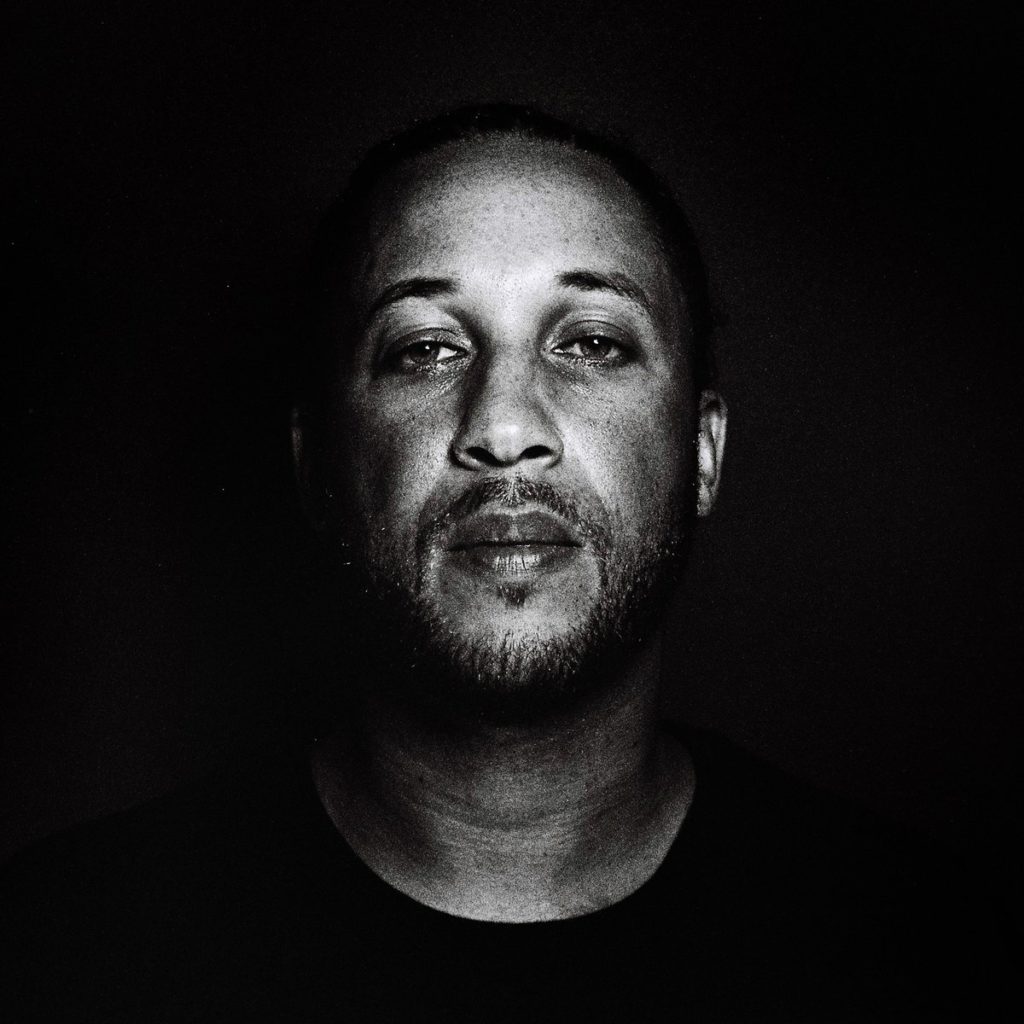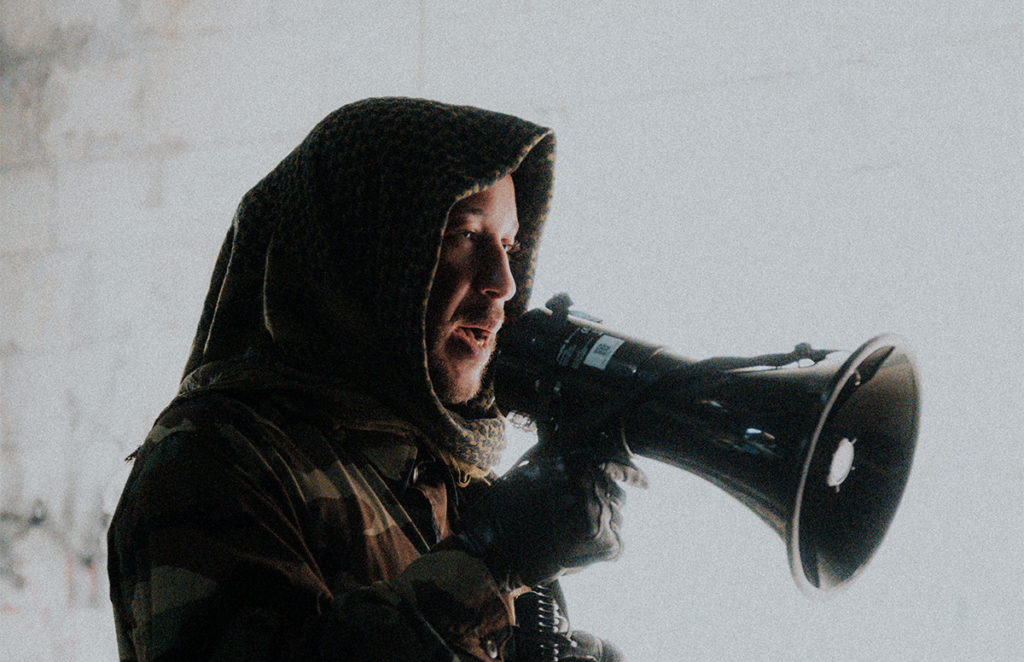Text: Rob Schenk
Rider Shafique has been busy, recording on more than 15 releases for a wide range of labels since 2018. More recently, he was featured on Dub-Stuy’s latest Riddim release “Santa Muerte”, the powerful “When Shall We Rise” on ZamZam Sounds as well as his latest single “Burn” in collaboration with the Bug. The MC and poet is also currently recording his own solo project with help from Sam Binga after their most recent Japan tour in 2019. I had the privilege to sit down with Shafique and talk about the meaning behind his music, his experiences with race and cultural identity, and the power of inspiration.
Shafique came to prominence through his work with Pressure Drop in 2009, working with singer Mr. Melody. They eventually recorded an album as Black Canvas on Cool and Deadly Records, which led to Shafique connecting with Sam Binga (known as Baobinga at the time) as well as Kahn. Shafique’s collaboration with Kahn on the track “Prophet” blew up, and the rest has quickly become history.
But what was Rider Shafique doing before all this?
“Before Pressure Drop and Black Canvas, music was always a constant in life growing up,” Shafique explains. “Music was the main reflection of where we saw ourselves, as black or caribbean people in the UK. My uncles are only 8 years older than me and they all did music. They were DJs and they had cassette tapes. It’s kind of a growth, a natural progression: you start in your room, taping the radio. Next you travel and you get tunes and you’re buying a microphone and writing your lyrics.”

“I dreamed of sound systems, and I started performing at talent shows and MCing over my friends’ jungle mixes. It just slowly grew like that, and the people around me were trying to make their own tracks rather than using instrumentals, so I started writing my own beats. I was learning my craft, so I couldn’t always get the beat I wanted,” Shafique laughs. “You might go back the next day and it’s changed, but I just loved it so much and I kept doing it and kept doing it and learned how to rhyme on all these different beats. Then Pressure Drop called and I had learned my voice by then, and I kinda knew what I was doing.”
Shafique’s voice is the key to this conversation; listening to him speak, his tone is cool and his cadence is gentle, like water running over smooth stone. But when Shafique MCs, it shifts from calming to cataclysmic. Spanning multiple genres and focusing on civil rights issues from women’s rights to racism, Shafique collaborates with producers around the world, using his ability to rhyme and create as a method of promoting consciousness.
“I create for myself,” Rider says. “When I write a lyric I know if it’s rubbish or not. I don’t try to make anybody like it. People like me if I’m authentic and stay true to myself. When a producer gives me his work, I don’t want him to give me what he thinks I’ll like, because I won’t like it,” Rider chuckles.
“I want them to give me their best work and we’ll meet in the middle. I’m conscious in what I do; I do not mislead people or give people the wrong message. My song ‘Proud’ is about women and body image. I could have made it about the typical topics, but I have the power to write and say whatever I want. Do I write a song about ‘wine up for your man’ or about loving yourself? The power’s within me to say whatever I want, I can create whatever I want, and I’m aware of that. Conscious, unless I’m commissioned to do something specific. When I’m creating I don’t have anyone in mind, I’m trying to reflect myself as true to myself as I can.”
But staying true to himself combined with his experiences of life in the United Kingdom can take their toll.
“As exhausting as making the music is, living it is 10 times as exhausting,” Shafique sighs. “Race is something I’m aware of every day. It’s a constant struggle. When I open Facebook and see another black person shot, that’s more tiring to me than writing about it. What’s also tiring is when people call me a racist or attack me for what I do, and constantly having to explain yourself. Not everything is written for everybody. If I speak in a dialect you don’t understand, maybe it’s not for you, with all due respect. I want to help people understand their legacies. If you’re trying to cure cancer, you don’t ignore people with HIV, but you have to focus on the cancer.”
Shafique’s experiences with race, identity, and culture led to the creation of “I-Dentity,” a 45 minute play exploring these ideas. “People wanted me to explore theater, and why there’s a lack of diversity in theatre audiences in the UK,” Shafique says. “When I was writing that piece I based it on myself and my strengths; the conversations that I was always having we’re about identity and culture. I was given a few soundscapes and bits and the theme ‘identity’ and I just wrote that play. That’s what came to me. I never purposely set out to make it, it just came to me.”
The play traveled around the UK, with Rider performing on stage and in local schools. Performing it for children was especially illuminating, and Rider’s experiences working with children helped “make me aware of a lot of things and issues in the world,” he explains. “It’s not as simple as people are good or bad. There’s generational abuse and cycles of pain and hurt and all these things that have been going on for years and years. It makes me more mindful and more aware of the issues that are in the world. There’s a lot more grey areas,” he said thoughtfully.
Besides his music and theatrical work, Rider also works with photography: his ongoing project LOC’S with Khali Ackford focuses on creating positive images of black people, something Shafique felt was sorely lacking. “It’s about creating what I didn’t have when I was growing up. I never grew up with a figure with mixed heritage,” he says. “I never saw a film with black and white parents. Where’s the mixed superhero? Where’s the black cartoon hero? This is for me to create!”

“When we go to museums and theaters and all these places, we don’t see ourselves,” Shafique adds. “If you go to the UK and ask a child to draw a person, it would be white. So many of these artworks have their roots in Africa and in storytelling from the beginning of time. Through[out] my life, my frustration is that people don’t create from their perspective, they create for what they think they should do.”
But for Shafique, LOC’S is also about building community:
“I live in a small city in England, and there’s lots of creatives here. But with something like a music video or an album cover, people wouldn’t want to do it outside their house. We’re always trying to go somewhere else. But if we do what we know, we’re much stronger. People see this project and they say ‘oh this is amazing’ but I see these people every day. Instead of doing an amazing, extravagant photo project somewhere else, there’s something equally as great on my doorstep. But it takes something to see that, however, and to value what we see.”
This dedication to art in all forms and Rider Shafique’s drive to create and bring awareness to issues surrounding race and identity have not only made him a prominent and in-demand vocalist; they have made him one of the most powerful voices in sound system culture. And he is hard at work on this next project: his own album.
“I’ve had some sessions in the studio to create some tracks, and Sam (Binga) has helped me with some of the bits and pieces. It’s still in the early stages,” he explains. “To me this takes a lot more work and it’s a lot more thoughtful. I want to create an album with a beginning, middle and end. It’s a complete body of work, and once I’m finished I want to take it somewhere else beyond a tour. Make it a complete package, perhaps with a short film and some stage design. I want to bring in all these elements and aspects to create something that isn’t just a record.”

But with the onset of COVID-19, Shafique’s plans have shifted. “COVID is frustrating, in a sense. Not in a selfish way, but it’s frustrating that you don’t really know what’s going on one hundred percent,” he notes. “The thing that bothers me is the lack of clarity about what’s happening. I don’t think there’s one group of people who really understand everything, neither the medical industry or politics. It’s very confusing to me. I do like the fact that the Earth is healing and it’s kind of slowing down. We see that some of the things we chase after and call important aren’t really that important. But my fear is that we might go back to doing the same things we were, and we might indulge.”
When asked about how it’s affected the creation of his album, Shafique was honest. “I’m finding it harder to write music,” he said. “Working on the photography and other projects has been a lot easier for me, rather than the music.”
For now, Shafique is doing what he always does; creating and searching for inspiration, both in and outside of music. “Right now I like the new wave of reggae coming out of Jamaica, Protoje, Jah9. I really like Jah9’s work, it’s not so far away from the kind of sound and lyrics that got me inspired back when I was younger. I listen to all music but reggae and roots music is the stuff that really inspires me. When it connects some dots and makes real complete sense on why we’re here and why certain things are happening, that moves me more than anything else. It’s a resurgence in that kind of sound and consciousness about livity and healthy living and how you act and behave and black consciousness.”
“I’m inspired by a lot of people,” he says. “I think people have an image of me that’s partly me but they’d be shocked to discover me outside the image. I’m not complex, but I think I am a bit complex, “ Shafique laughs. “I went to watch Schoolboy Q, and I liked his style and I liked his stage presence. It was great. He’s talking about drugs and sex, which people might think is opposite to my music, but he was so simple. That affects people and how they feel, because when he was onstage I believed what he was saying. And if you see someone on stage and you can experience their world first hand, that’s inspiring.
“It inspires me to help people feel that way about my music, and how I can connect them with my experience.” Shafique concludes. His voice grows passionate, reflective. “I draw inspiration from everything, man. I was watching Malcolm X speak, James Baldwin interviews, and his logic and how passionate he is. I’m watching Bob Marley, when he’s being interviewed and how he talks. There’s lots that make up Rider Shafique, not just the bass music. There’s so much more that goes into me and who I am.”

Find Rider Shafique’s latest release on Dub-Stuy “Santa Muerte” through our Bandcamp. Watch the music video below.
